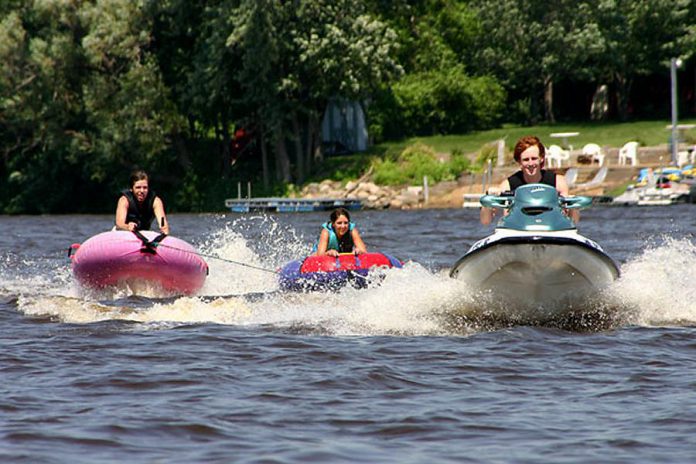
The August long weekend is one of the busiest weekends of the summer, with people heading out to rented cottages, having friends and family at their own cottages, and celebrating the height of summer on the water and with fireworks.
To ensure the good times, you should keep in mind your legal liability and obligations when renting out your cottage, having guests on your cottage property, partaking in activities like swimming and boating, and setting off fireworks.
Being aware of your responsibilities in advance may help prevent you from getting in trouble or from ruining the rest of your summer — or even your life.
The following information has been provided by Ari J. Singer, Personal Injury and Insurance Lawyer at Singer Kwinter.
General Liability
If you’re renting your cottage out, you’re required under the Occupiers’ Liability Act to keep the property reasonably safe for the renters. Reasonably being the key word. For example, if you are aware of dangers that subsequently cause an accident, you can be held responsible.
It’s also a frequent occurrence that your insurance company doesn’t realize your cottage is a cottage (that is, not used all year long or during the week). This can lead to a complete loss of coverage in the case of any loss (including theft, water damage, or fire).
When it comes to supervising guests at your cottage, activities like swimming and drinking are inherently more risky and increase your duty to supervise. But your level of responsibility depends on the relationship between the parties. For example, you have less of an obligation to supervise adult guests who bring their own boat or equipment, or who go for a swim by themselves.
Alternatively, if you’re in a position to supervise kids or teens (whether they’re yours or not), you have an obligation to keep them reasonably safe. Again the word reasonably comes up — if you’re aware of dangerous situations you must address them or you could be held responsible.
As a host, you are generally not responsible for the activities of adults once they leave your premises (for example, if they’ve been drinking and get into an accident). However, if the visit was similar to a commercial party (selling alcohol), you may be held responsible.
If you allow minors to use alcohol or recreational drugs and there are injuries to them or to third parties, you can be held negligent.
Boating
If you own a boat, be diligent about checking your insurance policy. If someone else drives your boat and an accident occurs, insurance may not cover it. Your boat may or may not be insured under your house policy, seasonal property or auto policy unless you specifically tell your insurance company.
Activities like boating, water skiing, tubing, wakeboarding, and so on are inherently dangerous. If you’re operating the boat or jet ski towing the participant, you’re reasonably responsible for their safety. For example, you’re responsible for injuries caused by bad equipment, negligent driving, and negligent supervision. A common example would be driving at high speeds and/or an advanced difficulty-level, after the participant has told you they are a beginner.
Seven Person Boat Crash
Fireworks
Laws regarding the use of fireworks are governed by the city/region/municipality, and different areas have different by-laws indicating where and when you can use them.
Regardless of which region you are in, if you use fireworks in a negligent manner — such as too close to people or a building — you can be held civilly responsible and sued in the event of an accident. The same applies if you allow someone on your property to use fireworks in a negligent manner. As well, if you use fireworks to intentionally cause damage or harm to someone, your cottage insurance policy may not cover you. Depending upon the specific facts, you can also be charged criminally.
You’re allowed to use approved consumer fireworks for private use only. If you plan to put on a public display of any kind, you must have a permit — regardless of which type of fireworks you use. More information on this would be available from your city’s firework bylaws.
Perfection is not required, and accidents do happen. But because of the inherent danger of fireworks, people should be extra careful to avoid injuries and lawsuits.
Fireworks cannot be used during an imposed fire ban.
You can be held liable for nuisance damages, charged with harassment, or ticketed if you knowingly allow fireworks or any other noise to disturb other property owners.
If you use fireworks and you set your cottage on fire, even accidentally, your insurance policy may not cover any or some of the damage. This would depend on the specific insurance policy and exclusion terms.
Kawartha Lakes Fire and Rescue offers the following tips for safe use of fireworks:
- Use fireworks only in accordance with the manufacturer’s instructions
- Do not set off fireworks closer than 30m to any structure or property line
- Use the fireworks in a manner that will not cause risk to persons or property
- Do not use fireworks indoors, on a public street or in a public park
- Do not use fireworks within 100m of a church, school, residential care facility or a place where explosives are sold or stored
- Do not hold the fireworks in your hand during use unless the manufacturer’s instructions indicate to
- No one under the age of 18 is to set off any consumer fireworks other than a sparkler while under the supervision of a responsible adult
- The use of fireworks is prohibited during any imposed burn ban.
Dangers of Consumer Fireworks – U.S. Consumer Product Safety Commission


























